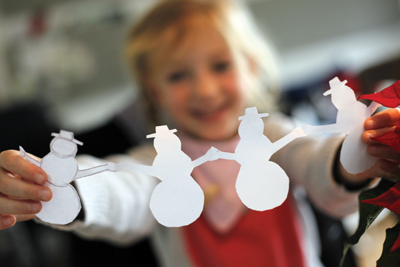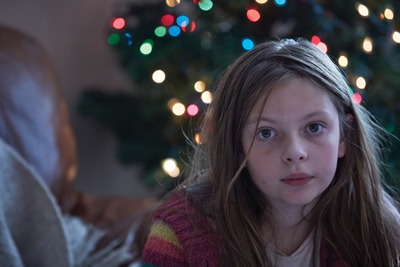
by Sally-Ann Barker
Potter’s House Preschool
It’s that time of year when Early Years practitioners are beginning to think about how to make Christmas magical for the children in their care. For a vast number of children Christmas doesn’t look like the John Lewis adverts – it’s a time of year that has the potential to spark a lot of emotions that are difficult to process and even more difficult to vocalise. So, when we think about putting on a nativity this year it’s worth asking ourselves who we’re doing it for? It’s a question I prompt my staff to ask themselves in every area of their practice several times a day. Who am I doing this for? Why? Who does it benefit? The nativity is much the same.
Many moons ago early on in my career, I assisted with nativity prep for my preschoolers – aged two to four. I watched as my manager wrote a script, sourced costumes, coached the children with lines, taught the children songs and definitely lost her mind for a good month. We all know that feeling. The children were superb; they were shining examples of confidence and resilience during every run through. I couldn’t tell you if any of them actually had any idea what was expected of them, let alone understood the nativity story at all. After a gruelling three weeks of nativity prep – during which time there was a vastly limited amount of natural learning going on – the day came for the children to perform. The little girls with blond hair were angels, the boys were shepherds and wise men, the little girl with dark hair was Mary – we’ve seen it a thousand times, let’s not even begin to talk about the politics of casting roles.
The parents, grandparents and younger siblings filled the big hall and the anticipation and excitement were palpable. I’ve always loved the buzz of a good ‘show’ and it was lovely to see the pride on the parents’ faces.
The curtains opened and the music started and the children stood stock-still. Nobody sang. Some waved at their parents, some cried, one ran off the stage and sat with their baby brother, one had an accident and one started screaming at the top of her voice in sheer terror. After a few minutes and some reassuring cuddles a few started to sing. The rest is a blur, I have vague memories of parents thanking the staff and taking pictures of the children but in between I think I probably have deliberate memory loss.
It was the last day of term so I spent the next two weeks recovering from the stress and confusion. With it being so early on in my career, I didn’t have the confidence to ask why on earth we put them through that but I’d love to go back in time and ask all the questions I should have asked then. Why did we do this? What developmental benefit was there? What message is this sending to the families who don’t celebrate Christmas? Because when you ask yourself those questions as a practitioner, it changes your perception. Our responsibility isn’t the cute photo of a little boy dressed up as a donkey for his grandma’s mantlepiece. It’s not making sure the children are able to sing ‘We wish you a merry Christmas’ word perfectly.
Our responsibility is the physical, emotional and mental wellbeing of the children in our care – their learning and development too.
For as long as the responsibility has been on me to ensure Christmas is acknowledged and celebrated within a setting, I have made an effort to remove all pressure on the children, staff and parents. I try to make it as natural as possible, there are no expectations of anyone and nobody is asked to ‘perform’. For story time we read versions of the nativity and books about how other cultures celebrate – but it’s just story time. We have a small world play nativity scene on offer and some traditional costumes available for dressing up. We have Christmas songs playing in the background and offers of card making on the table but as always, they are all offers and not requirements.
We often see a natural nativity and if we are quick enough, we can catch glimpses of it on film. We see the children decide to dress up and act out what they heard during story time because they made the connection on their own. We see the way they’ve interpreted the story and the wonderfully imaginative additions they’ve made to it – Joseph wasn’t a carpenter, he was Spiderman. We see them putting Mary on the donkey in the small world play and dinosaurs on the roof of the stable roaring loudly at the baby Jesus in the crib. Most importantly of all, we see the learning outcomes – the development of language, sequencing and imaginative thinking. We have happy children, relaxed staff and parents who aren’t up until the early hours gluing cotton wool onto a t-shirt for their baby’s sheep costume.
There is no right or wrong way to celebrate anything in your setting, provided you’re doing it for the right reasons.
For more information please contact Sally-Ann at sallyann@pottershousepreschool.co.uk or call 07375 379148 www.pottershousepreschool.co.uk



 panto. And even though we all know who wins, there is nothing quite so uplifting as seeing these morals reaffirmed. But not so fast, there’s tension, there’s anticipation, there’s always what if… So the shared sense of happiness that eventually fills the auditorium is palpable, and for children – the triumph of good over evil is a powerful message of hope and inspiration.
panto. And even though we all know who wins, there is nothing quite so uplifting as seeing these morals reaffirmed. But not so fast, there’s tension, there’s anticipation, there’s always what if… So the shared sense of happiness that eventually fills the auditorium is palpable, and for children – the triumph of good over evil is a powerful message of hope and inspiration.









